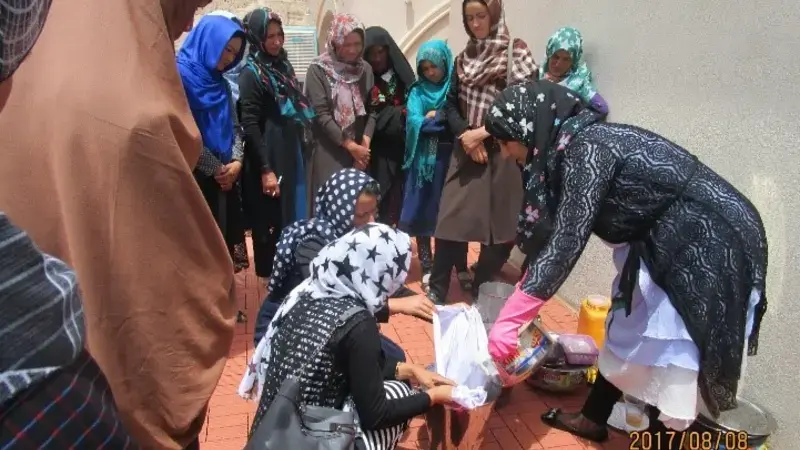Post-conflict restoration of agricultural systems

ICARDA expertise helps fragile states and territories' transition after internal shocks have devastated their agricultural production systems. Lessons learned in Afghanistan, Iraq and Palestine could hold the key to future rebuilding efforts in Yemen and Syria.
The agricultural sectors of countries emerging from conflict often have to contend with a multitude of challenges: destroyed crops and food stores, weakened national seed production and distribution systems, damaged equipment, and degraded national plant genetic resources.
For over 40 years ICARDA has worked in several post-conflict countries – including Afghanistan, Iraq and Palestine – where the Center has gained unique experiences that offer a framework to rapidly rebuild well-functioning agricultural systems and strengthen national food security.
ICARDA offers expertise, services and technology packages that cover several crucial areas, including: re-establishing national crop heritage; developing improved crop varieties; initiating fast-track seed supplies; developing national food crop genebanks; supporting new value chains that generate new income streams for local communities; and raising the capacity of national centers for research and innovation.
Afghanistan: value chains and rural development
In Afghanistan ICARDA and its partners have pilot-tested and put into action a number of agricultural value chains: greenhouse production of off-season and high-yielding vegetable crops, local production by women’s cooperatives of herb oils for high-value domestic and export markets, and livestock production for meat and dairy products – for household security and sale in local markets.
The Center has also promoted mechanization to increase agricultural production and raise incomes –developing local services that produce, market and repair machines and tools. ICARDA also supports national efforts to create and build a private sector, running specialized technical training courses for farmers and government officials.
In addition, ICARDA has supported local partners to train some 6500 women in small enterprise creation, kitchen gardening, farming practices, sheep and goat production, and quality seed multiplication.
Iraq: new investments to raise productivity
In Iraq, a range of value chains were tested and recommendations made for the future development and diversification of Iraq’s agricultural sector. Efforts were also made to address the country’s salinization. Some 75% of the country’s total irrigated area – around two million hectares (ha) - is saline and farmers of saline soils use only 30% of their land for cropping, achieving only 50% of their expected yields. The result: national productivity losses of some 300 million USD every year. The multi-partner ‘Iraq Salinity’ initiative proposed solutions and an investment plan to rejuvenate production on salt-affected lands.
Additional efforts focused on date palm production. Shifting from chemical pesticides to more cost-effective and sustainable bio-pesticides boosted productivity, raised farmer incomes, and brought significant environmental benefits. Another major focus in Iraq was the promotion of Conservation Agriculture (CA) – the practice of not plowing farmlands and leaving crop residue in the field for improved soil fertility and water conservation. In response to the prohibitively expensive nature of imported zero till seeders, ICARDA stimulated the creation of local markets for their manufacture and repair. The move contributed to the spread of CA across Iraq – from 0 ha in 2007 to over 15,000 ha in recent years.
Palestine: building a national agricultural system
In Palestine the Center’s researchers have focused on building a national agricultural system and strengthening the capacity of research and extension activities, targeting the introduction of new technologies to increase farmer incomes. Efforts include: strengthening crop genetic resources and creating a national genebank; introducing improved higher-yielding wheat varieties; using grey/wastewater irrigation; and introducing protected agriculture.
Lebanon: Food and jobs for refugees
In Lebanon, we support farmers who have faced an influx of 45,000 refugees on the Lebanese–Syria border by improving farmer livelihoods and creates job opportunities through a 'Social Stabilization' project that targets better water productivity and rainfed crop management.
Sudan: Strengthening food systems under a climate crisis
In Sudan, a country particularly vulnerable to the effects of intensifying climate change and ongoing unrest, we work to maximize agricultural productivity by developing and implementing water-harvesting and crop-range-livestock system interventions. Given the last decade's increase in intensity and rate of droughts, this has vastly increased the surrounding rural farming communities' livelihood resilience. It has also sparked interest from neighboring communities and further moves by the Sudan government to expand the intervention to other parts of the country.
Yemen: Better yields and nutrition
In Yemen, we are successfully improving yields and quality of fresh products free of pesticide chemicals that are scarce due to unrest across the country. Implementing better techniques provide farmers with increased income and produces healthy, high-quality cash crops with minimum pesticide residue. In peacetime, the practice will continue both for health reasons and its economic savings without expensive inputs.
Preparing now for tomorrow
Today’s conflicts in Syria, Yemen, and elsewhere, continue to take a heavy toll on agricultural production systems. However, learning the lessons of past efforts now can inform the preparation of effective reconstruction strategies after conflicts pass. With sufficient backing from donors ICARDA and its partners can rebuild the agricultural fabric of fragile states and territories and eventually generate new income opportunities to revitalize rural communities.
